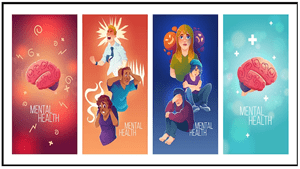
POTSDAM, NY – Feelings of depression, anxiety, or trouble focusing are not concerns faced by adults alone, children may also experience such emotions.
February is Youth Mental Health Awareness Month, and while many people may correctly associate ADD or ADHD (attention-deficit/hyperactivity disorder) as the main childhood behavioral health diagnosis, there are, in fact, several others.
“Since the onset of the coronavirus pandemic, rates of anxiety and depression have significantly increased, and this trend is consistent with children we are treating in our psychiatry offices,” stated St. Lawrence Health Psychologist Laurie Zweifel, PhD. “In addition, we have seen an increase in referrals for eating disorders, obsessive-compulsive disorder, self-injurious behaviors, suicide ideation, and coping with bullying and cyberbullying.”
Remote schooling during the pandemic affected peer interactions, due to a lack of face-to-face social connections, which in turn affected social relations related to support, problem solving, and a sense of belonging. Students reported increased isolation and an increase in video gaming and electronics/social media use. Remote schooling also affected students’ ability to access counseling services to address social-emotional concerns. Further, it was more challenging for school counselors to identify and refer students for community mental health services and supports.
If a parent or adult notices changes in a child’s behavior, it is important to check in with the child to communicate those concerns. This support encourages the child to open up about how they are doing.
“It is important for parents to convey that their child can talk to them about anything, no matter what it is, along with the message that ‘we can figure it out together.’ Communication is encouraged without the threat of punishment,” Dr. Zweifel said.
“Showing children you are listening, understanding, and validating their feelings encourages further communication. Often, adolescents do not want their parents to ‘fix’ the problem; they want to be heard and supported,” she added.
Seeking Professional Advice
According to the Center for Disease Control and Prevention (CDC), “Mental disorders among children are described as serious changes in the way children typically learn, behave, or handle their emotions, causing distress and problems getting through the day.”
Mental health includes our social, emotional, behavioral, and mental functioning. While parents can observe their children’s behaviors, they cannot see their thoughts and feelings. It is also important to realize the behaviors they are observing may not necessarily reflect their child’s mental health or feelings. When concerns arise about a child’s mental health, it is beneficial to seek interventions with a trained professional.
“Mental health providers will offer an objective assessment of the child’s concerns, and are able to make recommendations based on their understanding of child developmental and family systems,” Dr. Zweifel said. “It can be helpful to describe the benefits of talking to someone who is not directly involved in their home or social circle in order to provide a safe space to talk freely without any negative consequences.”
Approaching a child about the topic of speaking with a mental health professional needs to be done in a supportive way. Conveying concern for the child and offering a way to help them feel better and improve their distress is essential. As schools recognize the increased need for mental health support for students, some districts now have social workers along with counselors, who are available to work with children. Some youngsters may be more open to talking with a counselor at school, as it a familiar environment.
Another factor for parents to take into consideration when dealing with their child is to be sure and talk with them at their age level; children are not mini-adults.
“Their brains process information very differently than an adult’s. Children are developing and maturing socially, physically, emotionally, and cognitively. It is important to provide mental health interventions that are age-appropriate for their developmental level. Children have different reasoning skills, are often impacted more by peer pressures, and do not always have control of their environments; parents and other adults often make choices for them,” Dr. Zweifel said.
St. Lawrence Health offers outpatient Behavioral Health services in Gouverneur, Massena, and Potsdam.